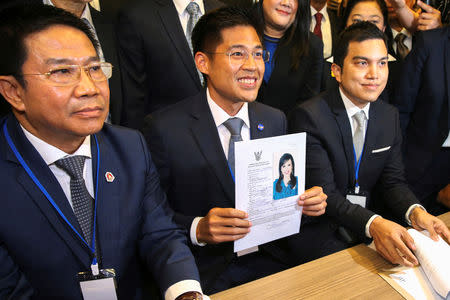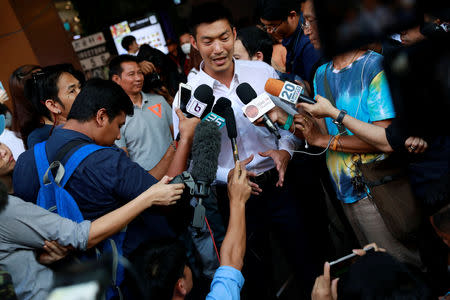Thai court rules next week on banning party that nominated princess for PM
By Patpicha Tanakasempipat
BANGKOK (Reuters) - Thailand's Constitutional Court said on Wednesday it will give its ruling on March 7 on whether to ban an opposition party for nominating a princess as its candidate for prime minister in a general election.
The Election Commission asked the court to dissolve the Thai Raksa Chart party after it nominated Princess Ubolratana Rajakanya Sirivadhana Barnavadi for prime minister in the March 24 election, the first since a 2014 military coup.
Even though Ubolratana relinquished her royal titles in 1972 when she married an American, her bid to enter politics on the side of the anti-establishment opposition was hugely controversial.
Just hours after the shock announcement, King Maha Vajiralongkorn said his sister's bid was "inappropriate" and unconstitutional. She was swiftly disqualified by the election commission.
The banning of Thai Raksa Chart, one of several parties loyal to military-ousted ex-premier Thaksin Shinawatra, would be a set-back for opposition chances in the election.
"There will be a verdict on March 7 at 1.30 pm and the verdict will be read out to concerned parties on the same day at 3 pm," the Constitutional Court said in a statement.
Earlier on Wednesday, prosecutors said they would decide after the election whether to prosecute a criminal case against a leader of another political party who criticised the military junta in a speech on Facebook last year.
Thanathorn Juangroongruangkit, a 40-year-old auto parts billionaire and political novice, could be jailed for up to five years under the Computer Crime Act for "uploading false information" in a speech posted on Facebook in June.
Thanathorn has gained popularity, especially among young people, for his use of social media in the campaign and calls to end military meddling in politics..
His Future Forward Party has denied the charges against him and two other party members, and Thanathorn said the case against him is politically motivated.
"We believe in our innocence. We believe in the rights of the people to criticise those in power, the fundamental rights of democracy," he told reporters.
The legal moves against opponents of the junta have raised questions about the fairness of Thailand's electoral process.
The election is seen as a battle between voters who want junta chief Prayuth Chan-ocha to retain the premiership and political parties, including the populist forces backed by Thaksin, that want to see the end of military rule.
"The legal mechanism has been exploited by those in power to threaten their opponents," said Titipol Phakdeewanich, dean of faculty of political science at Ubon Ratchathani University.
"The move today creates uncertainty over two parties and shows that the military establishment is still in control and this could create more problems in the future," he told Reuters.
(Reporting by Patpicha Tanakasempipat, Panu Wongcha-um, and Panarat Thepgumpanat; Editing by Paul Tait and Darren Schuettler)



